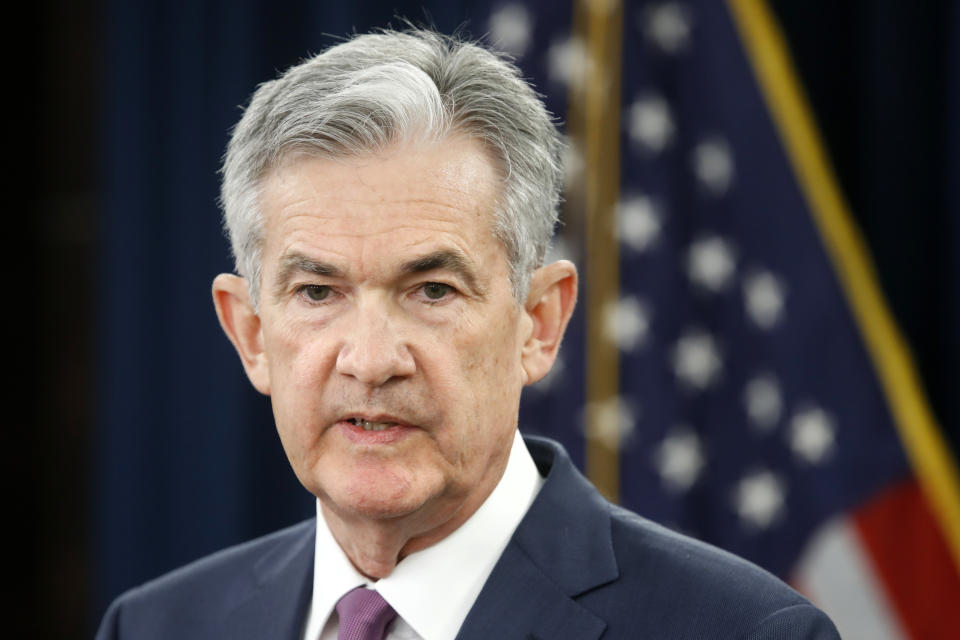Jackson Hole and retail earnings — What you need to know for the week ahead
Stocks finished a chaotic week on a positive note, with more positive trade news boosting the Dow and tech stocks hanging in there despite more bad news from the chip space.
Each of the major averages rose on Friday, with the Dow adding 0.4% while the S&P 500 logged a more modest 0.3% and the Nasdaq held onto gains with a 0.1% advance. For the week, the Dow gained more than 1% while the Nasdaq lost ground and the S&P 500 rose, but just slightly.
The most notable stock move last week was Walmart (WMT), which gained more than 9% on Thursday after the company reported its biggest sales increase in a decade to highlight what was a busy week for the retail sector. On the other side of Walmart’s success is J. C. Penney (JCP), which fell to a generational low after its quarterly results, with the stock finishing the week at $1.79.
Elon Musk, of course, continued to garner headlines last week and is sure to do so in the week ahead, with shares of Tesla (TSLA) dropping almost 9% on Friday after Musk gave an interview to The New York Times that indicated the CEO is under significant pressure.
Referencing the period earlier this year when Musk was working to get Tesla’s production of its new, lower-cost Model 3 sedan up to 5,000 vehicles in a week — a milestone that was important both for the company and investors — Musk said, “The worst is over from a Tesla operational standpoint… But from a personal pain standpoint, the worst is yet to come.”
It seems unlikely Musk will not be a part of the investing story this coming week.
In the week ahead, the economic calendar will be fairly calm with the highlight coming on Friday morning when Federal Reserve Chair Jay Powell speaks at the annual Jackson Hole economic policy symposium, the year’s most important meeting for economic and monetary policy discussions.
According to the Fed, Powell’s speech, set to be delivered at 10:00 a.m. ET, will address the topic of monetary policy in a changing economy. The full agenda of of the symposium will be posted on Thursday evening.
Wednesday’s release of the minutes from the Federal Reserve’s latest meeting will also be closely watched by markets.

And on the earnings side, it will still be a big week for the retail sector with Target (TGT), Kohl’s (KSS), TJX Companies (TJX), Lowe’s (LOW), L Brands (LB), Ross Stores (ROST), The Gap (GPS), and Foot Locker (FL) all set to report earnings.
Other members of the S&P 500 set to report results in the week ahead should include Medtronic (MDT), Autodesk (ADSK), HP Inc. (HPQ), and Intuit (INTU).
Economic calendar
Monday: No major economic data set for release.
Tuesday: No major economic data set for release.
Wednesday: Existing home sales, July (+0.6% expected; -0.6% previously); FOMC Minutes
Thursday: Initial jobless claims (215,000 expected; 212,000 previously); FHFA home price index, June (+0.3% expected; +0.2% previously); Markit flash services PMI, August (55.9 expected; 56.0 previously); Markit flash manufacturing PMI, August (55 expected; 55.3 previously); New home sales, July (+2.7% expected; -5.3% previously); Kansas City Fed manufacturing, August (22 expected; 23 previously)
Friday: Durable goods orders, July (-0.7% expected; +0.8% previously); Durable goods orders excluding aircraft, July (+0.5% expected; +0.2% previously)
Donald Trump is trying to be pro-business again
On Friday morning, President Donald Trump surprised investors with a suggestion on how often quarterly earnings should be reported.
Apparently, not quarterly.
“In speaking with some of the world’s top business leaders I asked what it is that would make business (jobs) even better in the U.S.,” Trump said in a tweet. “‘Stop quarterly reporting & go to a six month system,’ said one. That would allow greater flexibility & save money. I have asked the SEC to study!”

The SEC, however, has been looking at this issue for some time and will continue to do so, according to chairman Jay Clayton.
Trump later said to a gathering of the White House press that he got the idea from outgoing PepsiCo (PEP) CEO Indra Nooyi. In a statement to Yahoo Finance on Friday, Nooyi said, “Many market participants, as well as the Business Roundtable which we are a part of, have been discussing how to better orient corporations to have a more long-term view.”
Adding, “Most agree that a short-term only view can inhibit long-term strategy, and thus long-term investment and value creation. My comments were made in that broader context, and included a suggestion to explore the harmonization of the European system and the U.S. system of financial reporting. In the end, all companies have to balance short-term and long-term performance.” In Europe, business are required to report results only every six months.
Yahoo Finance’s Julia La Roche spoke to two academics who think Trump’s suggestion is a positive for investors and managers.
The benefits and drawbacks of corporate earnings have been argued about by executives, academics, market participants, and others for years. This will not change in the wake of Trump’s tweet.
But what Trump’s tweet appears as much as anything to be about is the president reasserting his claim of being a pro-business president.
After getting elected in November 2016, Trump pushed to cut corporate taxes. Tax cuts were passed, and Trump’s policy push provided the backing for much of the stock market rally that took place after his win. Since topping out in January, however, stocks in the U.S. have been largely rangebound and the increasing uncertainty that investors are facing as a result of Trump’s actions on trade are a large part of why.
Over the last six months, however, Trump has moved aggressively to re-work U.S. trade agreements like NAFTA while also seeking to level what he sees as an uneven playing field when it comes to the U.S.-China trade relationship. This past week, trade-related headlines boosted stocks late Wednesday and again on Friday. Trade news moving markets has become the norm in recent months.
But as executives in the manufacturing industry told the Institute for Supply Management in its survey of manufacturing activity in the U.S., tariffs are impacting everything happening in the manufacturing space right now.
“The so-called trade war is now taking its toll on business activity, resulting in substantial reductions to new export orders,” said one executive in the wood products industry. “China has all but stopped taking orders, causing inventories to build up in the U.S.” Overall, executives in at least 8 industries mentioned tariffs as impacting business in some way.
And while Trump’s entire pitch to voters since the beginning of his presidential campaign has, in part, centered on his business success, his efforts to rework U.S. trade relationships have dented the market’s unfettered confidence that his economic agenda will be pro-business.
Loosening the burdens executives believe is placed on them by giving shareholders a quarterly update on their business is perhaps one way Trump can earn some forgiveness from the business community.
—
Myles Udland is a writer at Yahoo Finance. Follow him on Twitter @MylesUdland

 Yahoo Finance
Yahoo Finance 
